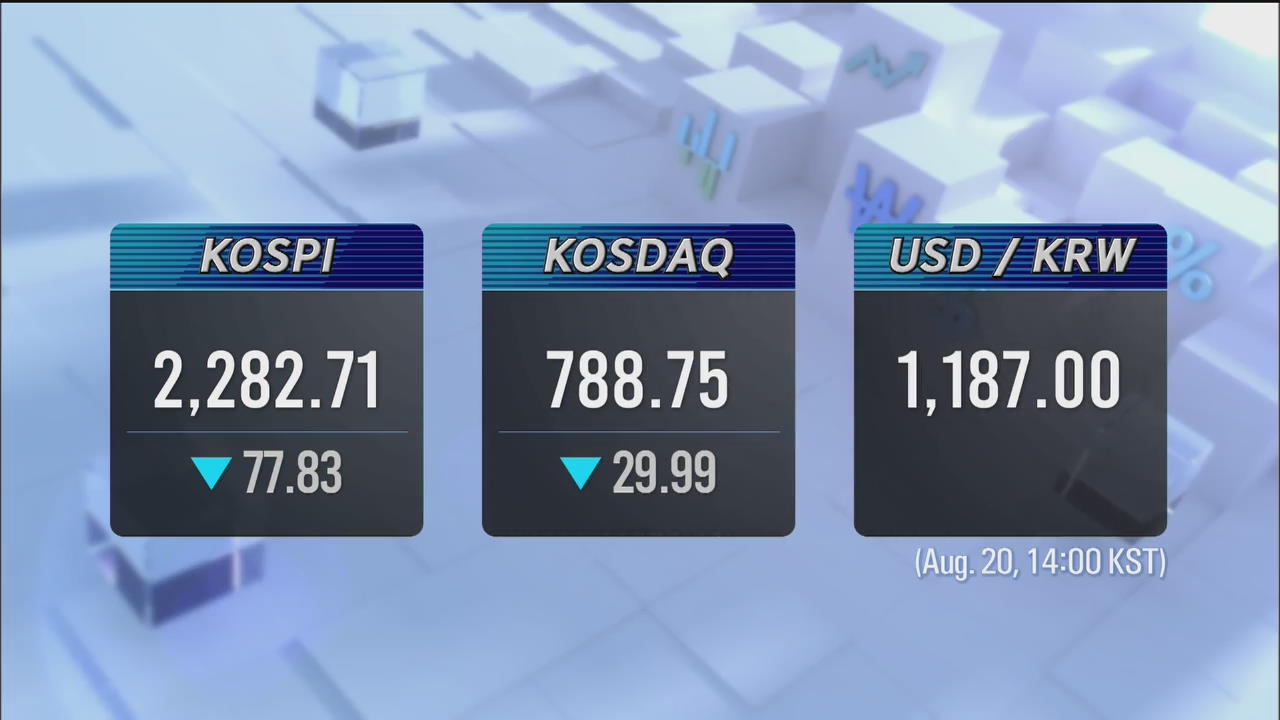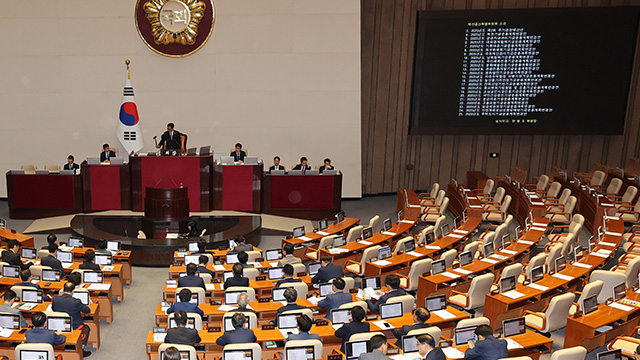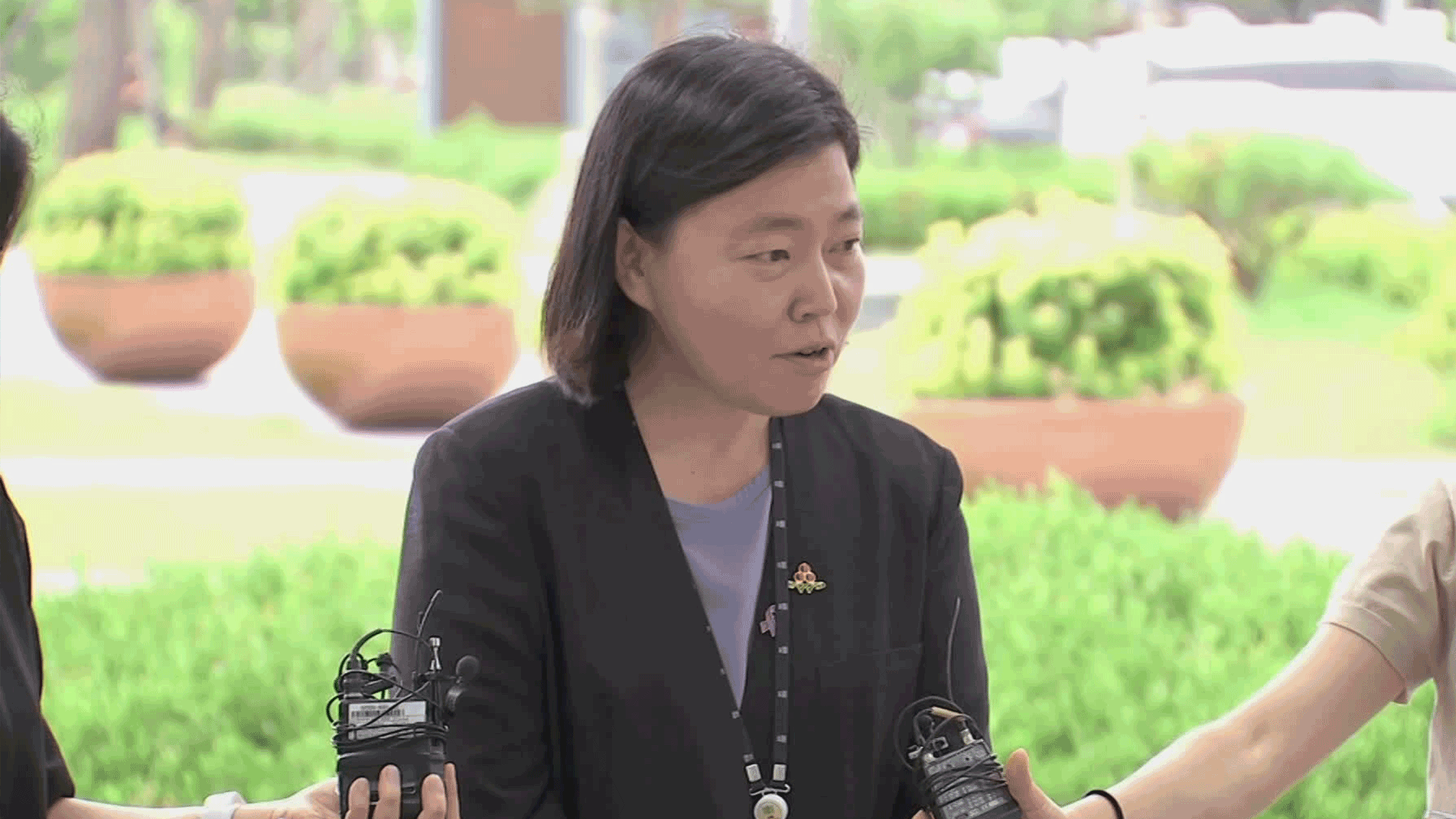NATION'S FIRST UNDERWATER ROBOT DEPLOYED
입력 2020.08.20 (15:16)
수정 2020.08.20 (16:46)
읽어주기 기능은 크롬기반의
브라우저에서만 사용하실 수 있습니다.
[Anchor Lead]
Concerns are mounting that global warming may bring irrevocable changes to the marine ecosystem. For the first time in Korea, an underwater robot was deployed in waters off Jeju Island to study the deep sea ecosystem.
[Pkg]
An underwater robot attached to a crane, enters the ocean. Before long, it reaches 50 meters below sea level. The robot approaches colonies of yellow sponge along with assorted marine plants and starts filming them. The underwater robot is exploring the mysterious world of the deep sea, which human divers cannot reach as easily.
[Soundbite] JANG IN-SEONG(DIRECTOR, UNDERWATER ROBOTICS R&D CENTER, KIOST) : "It is equipped with an HD camera and many other cameras that can photograph all sides, so it's very helpful in collecting data."
This robot developed by the Ministry of Oceans and Fisheries and the Korea Institute of Ocean Science and Technology is powered by a source stationed on land. That is why, it's capable of diving as deep as 2,500 meters, with practically unlimited operation time. It can carry out various tasks, including undersea pipelines or cables construction. Its underwater exploration capacity far exceeds that of human counterparts who can dive down 40 meters deep for up to one-and-a-half hours a day. This robot finished a complete ecological survey of Beomseom Island in a single day. A task that would require 100 human divers to spend three months.
[Soundbite] KANG DO-HYUNG(DIRECTOR, JEJU RESEARCH INSTITUTE, KIOST) : "We can save a lot of time and space in our monitoring efforts. If we can quantify the changes in the marine ecosystem, it will be quite helpful in protecting the island's environment."
Thanks to the underwater robot ecological studies of the Jeju seas are being carried out more expeditiously. The Korea Institute of Ocean Science and Technology plans to study every corner of the deep seas around Munseom and Jejudo Islands, which have been inaccessible to human divers.
Concerns are mounting that global warming may bring irrevocable changes to the marine ecosystem. For the first time in Korea, an underwater robot was deployed in waters off Jeju Island to study the deep sea ecosystem.
[Pkg]
An underwater robot attached to a crane, enters the ocean. Before long, it reaches 50 meters below sea level. The robot approaches colonies of yellow sponge along with assorted marine plants and starts filming them. The underwater robot is exploring the mysterious world of the deep sea, which human divers cannot reach as easily.
[Soundbite] JANG IN-SEONG(DIRECTOR, UNDERWATER ROBOTICS R&D CENTER, KIOST) : "It is equipped with an HD camera and many other cameras that can photograph all sides, so it's very helpful in collecting data."
This robot developed by the Ministry of Oceans and Fisheries and the Korea Institute of Ocean Science and Technology is powered by a source stationed on land. That is why, it's capable of diving as deep as 2,500 meters, with practically unlimited operation time. It can carry out various tasks, including undersea pipelines or cables construction. Its underwater exploration capacity far exceeds that of human counterparts who can dive down 40 meters deep for up to one-and-a-half hours a day. This robot finished a complete ecological survey of Beomseom Island in a single day. A task that would require 100 human divers to spend three months.
[Soundbite] KANG DO-HYUNG(DIRECTOR, JEJU RESEARCH INSTITUTE, KIOST) : "We can save a lot of time and space in our monitoring efforts. If we can quantify the changes in the marine ecosystem, it will be quite helpful in protecting the island's environment."
Thanks to the underwater robot ecological studies of the Jeju seas are being carried out more expeditiously. The Korea Institute of Ocean Science and Technology plans to study every corner of the deep seas around Munseom and Jejudo Islands, which have been inaccessible to human divers.
■ 제보하기
▷ 카카오톡 : 'KBS제보' 검색, 채널 추가
▷ 전화 : 02-781-1234, 4444
▷ 이메일 : kbs1234@kbs.co.kr
▷ 유튜브, 네이버, 카카오에서도 KBS뉴스를 구독해주세요!
- NATION'S FIRST UNDERWATER ROBOT DEPLOYED
-
- 입력 2020-08-20 15:10:05
- 수정2020-08-20 16:46:25

[Anchor Lead]
Concerns are mounting that global warming may bring irrevocable changes to the marine ecosystem. For the first time in Korea, an underwater robot was deployed in waters off Jeju Island to study the deep sea ecosystem.
[Pkg]
An underwater robot attached to a crane, enters the ocean. Before long, it reaches 50 meters below sea level. The robot approaches colonies of yellow sponge along with assorted marine plants and starts filming them. The underwater robot is exploring the mysterious world of the deep sea, which human divers cannot reach as easily.
[Soundbite] JANG IN-SEONG(DIRECTOR, UNDERWATER ROBOTICS R&D CENTER, KIOST) : "It is equipped with an HD camera and many other cameras that can photograph all sides, so it's very helpful in collecting data."
This robot developed by the Ministry of Oceans and Fisheries and the Korea Institute of Ocean Science and Technology is powered by a source stationed on land. That is why, it's capable of diving as deep as 2,500 meters, with practically unlimited operation time. It can carry out various tasks, including undersea pipelines or cables construction. Its underwater exploration capacity far exceeds that of human counterparts who can dive down 40 meters deep for up to one-and-a-half hours a day. This robot finished a complete ecological survey of Beomseom Island in a single day. A task that would require 100 human divers to spend three months.
[Soundbite] KANG DO-HYUNG(DIRECTOR, JEJU RESEARCH INSTITUTE, KIOST) : "We can save a lot of time and space in our monitoring efforts. If we can quantify the changes in the marine ecosystem, it will be quite helpful in protecting the island's environment."
Thanks to the underwater robot ecological studies of the Jeju seas are being carried out more expeditiously. The Korea Institute of Ocean Science and Technology plans to study every corner of the deep seas around Munseom and Jejudo Islands, which have been inaccessible to human divers.
Concerns are mounting that global warming may bring irrevocable changes to the marine ecosystem. For the first time in Korea, an underwater robot was deployed in waters off Jeju Island to study the deep sea ecosystem.
[Pkg]
An underwater robot attached to a crane, enters the ocean. Before long, it reaches 50 meters below sea level. The robot approaches colonies of yellow sponge along with assorted marine plants and starts filming them. The underwater robot is exploring the mysterious world of the deep sea, which human divers cannot reach as easily.
[Soundbite] JANG IN-SEONG(DIRECTOR, UNDERWATER ROBOTICS R&D CENTER, KIOST) : "It is equipped with an HD camera and many other cameras that can photograph all sides, so it's very helpful in collecting data."
This robot developed by the Ministry of Oceans and Fisheries and the Korea Institute of Ocean Science and Technology is powered by a source stationed on land. That is why, it's capable of diving as deep as 2,500 meters, with practically unlimited operation time. It can carry out various tasks, including undersea pipelines or cables construction. Its underwater exploration capacity far exceeds that of human counterparts who can dive down 40 meters deep for up to one-and-a-half hours a day. This robot finished a complete ecological survey of Beomseom Island in a single day. A task that would require 100 human divers to spend three months.
[Soundbite] KANG DO-HYUNG(DIRECTOR, JEJU RESEARCH INSTITUTE, KIOST) : "We can save a lot of time and space in our monitoring efforts. If we can quantify the changes in the marine ecosystem, it will be quite helpful in protecting the island's environment."
Thanks to the underwater robot ecological studies of the Jeju seas are being carried out more expeditiously. The Korea Institute of Ocean Science and Technology plans to study every corner of the deep seas around Munseom and Jejudo Islands, which have been inaccessible to human divers.
이 기사가 좋으셨다면
-
좋아요
0
-
응원해요
0
-
후속 원해요
0

















이 기사에 대한 의견을 남겨주세요.